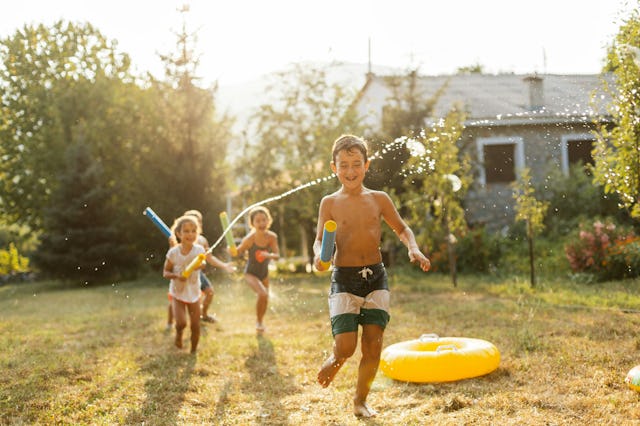Are Mosquito Stickers Safe For Babies & Kids?
They probably won’t hurt, but how much do they help? We asked experts for the scoop.

The sprinkler’s sprinkling, the sun is setting, and the kids are romping through the backyard — outdoor summer evenings playing in the water and getting covered in grass and dirt are the best. Except, of course, for those pesky bugs. By now, we’ve all seen mosquito stickers for kids, those little essential oil-drenched dots that you pop onto your kid to keep bugs at bay. At first blush, they seem way safer than bug sprays: They don’t contain any chemicals, and there’s no chance your kid will breathe in any spray. But are mosquito stickers actually safe for kids? There are a few things you should be aware of, experts say.
For starters, yes, mosquito stickers are safe to use. “Generally speaking, mosquito repellent patches are safe depending on the ingredients. Make sure you always look at the label to determine the active insecticides used for the patch,” says Darby McElderry, M.D., a pediatrician at Children’s of Alabama.
That said, she warns parents that they shouldn’t use any kind of bug repellent on infants younger than 2 months of age. And if you’re using mosquito stickers that list lemon eucalyptus oil as the active ingredient, save those for kids 3 years and older. Many stickers are citronella-based, but some brands use these lesser-studied essential oils.
“When choosing insect repellents made with oil of lemon eucalyptus, look for EPA-registered products. These products contain no more than 30% oil of lemon eucalyptus,” says McElderry. “The issue with many essential oil-containing repellents is the amount of the ingredient may not be regulated and may be much lower or higher than what is listed. ‘Pure’ oil lemon eucalyptus products have not been tested for safety as insect repellents and are not registered with the EPA as insect repellents.” In short, we don’t know enough about this essential oil to say it’s definitely safe.
Experts’ other concern about mosquito stickers is that, unlike DEET- or picaridin-based bug sprays, they don’t repel other insects, like ticks or certain biting flies. So, if you live in a wooded area where bigger bugs are a thing, just be mindful that mosquito patches may not cut it alone.
Fortunately, several insect repellents with DEET are considered safe and effective on kids older than 2 months, according to Alexis Monique Javier, D.O., a pediatrician at Children’s Memorial Hermann Pediatrics. “You can choose the lowest concentration to provide protection for the amount of time spent outside. For example, 10% DEET provides protection for about 2 hours, and 30% DEET protects for about 5 hours. A higher concentration works for a longer time, but anything over 50% DEET does not provide longer protection,” she says.
For example, if your kids will just be playing outside for an hour or two in the evenings, McElderry says a 10% DEET spray will offer plenty of protection from insects.
If you prefer to use a bug spray over a sticker, Javier says you should avoid applying it to your child’s hands, eyes, mouth, or over any cuts or irritated skin. If you need help finding the best possible insect repellent for your child — one that’s effective and safe — the EPA has an online tool to help you choose one.
Mosquito stickers are kind of the best if your kid just won’t stand still long enough to carefully apply bug spray, or if your child has sensitive skin that gets irritated by other products. Just be sure you’re following the age recommendations on the packaging and opting for sprays if you’re worried about more than just mosquitos.